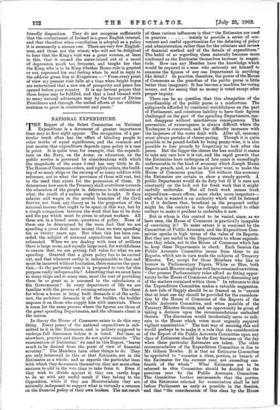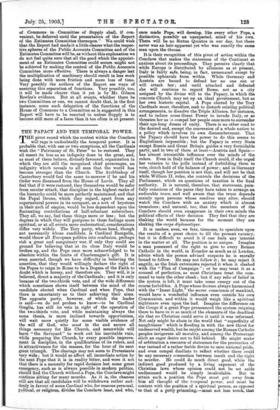NATIONAL EXPENDITURE. • T HEReport of the Select Committee on National
Expenditure is a document of greater importance than may at first sight appear. The recognition of a par- ticular truth often has the effect of blinding people to other truths of equal significance, and the common and just maxim that expenditure depends upon policy is a case in point. It is quite true, for example, that the expendi- ture on the Navy, on the Army, on education, on the public service is governed by considerations with which the magnitude of the sums voted has very little to do. The House of Commons orders, and rightly orders, the build- ing of so many ships or the raising of so many soldiers with reference, not to what the provision of them will cost, but to the need that exists for the possession of -them. It determines how much the Treasury shall contribute towards the education of the people in deference to its estimate of what the youth of a nation ought to be taught. It fixes salaries and wages in the several branches of the Civil Service, not from any theory as to the proportion of the national income that ought to be spent in this way, but by a rough comparison between the work that has to be done and the pay which must be given to attract workers. All these are, in a broad sense, questions of policy. None of them can be determined by the mere fact that we are spending a great deal more money than we were spending ten or twenty years ago. But when this has been con- ceded, the subject of national expenditure has not been exhausted. When we are dealing with tens of millions there is large room, and equally large need, for watchfulness to ensure that we are getting -full value for what we are spending. Granted that a given policy has to be carried oat, and that whatever outlay is indispensable to that end must be incurred without hesitation, there remains the ques- tion,—Is the particular sum it is. proposed to vote for this purpose really indispensable ? Admitting that we must have so many ships and so many men, must the cost of providing them be as great as is assumed in • the calculations of the Government ? In every department of life we are familiar with the process of revising estimates. The client for whom a house is being built demands it of the archi- tect, the architect demands it of the builder, the builder imposes it on those who supply him with materials. There is mem for the same process where the figures are those of the great spending Departments, and the ultimate client is the nation.
In theory the House of Commons exists to do this very thing. Every penny of the national expenditure is sub- mitted to it in the Estimates, and is politely supposed to undergo full discussion before it is voted. But here, as elsewhere, practice and theory do not quite coincide. "The examination of. Estimates," we read in this Report, "leaves much to be desired from the point of view of financial scrutiny." The Members have other things to do. They are only interested in this .or that Estimate, not in the Estimates as a whole ; and as regards the particular item with which they do concern themselves, they are more often anxious to add to the vote than to take from it Even if they wish to divide against it, they can rarely hope to do so with any useful result if they. belong to the Opposition, while if they are Ministerialists they are naturally indisposed to support what is virtually a censure on the financial policy of their own leaders. The net result of these various influences is that "the Estimates are used in practice . . mainly to provide a series of con- venient and useful opportunities for the debating of policy and administration rather than for the criticism and review of financial method and of the details of expenditure." The habit of so regarding them naturally becomes more confirmed as the Estimates themselves increase in magni- tude. How can any Member have the knowledge which would be required in a man who seriously set himself to examine the figures of any one Department in anything like detail ? In practice, therefore, the power of the House of •Commons as the guardian of the public purse is little better than imaginary. It has become a machine for voting money, not for seeing that no money is voted except after proper inquiry.
There, can be no question that this abnegation of the guardianship of the public purse is a misfortune. The safeguards afforded by continual watchfulness on the part of Parliament, and conscious liability to have their figures challenged on the part of the spending Departments, can- not disappear without mischievous consequences. The prevention of extravagance is always difficult where the Exchequer is concerned, and the difficulty increases with the largeness of the sums dealt with. After all,•economy must always partake of cheese-paring. Though it is quite possible to be pound-foolish'by being penn.y-wise, it is also possible to lose pounds by forgetting to look after the pence. But the bigger the cheese the less needful it seems to take any care how it is cut, and the rapid growth that the Estimates have undergone of late years is exceedingly unfavourable to the kind of economy which Joseph Hume used to preach, and, so far as his power went, to make the House of Commons practise. Yet without this economy the Estimates are certain to show a steady growth. A. public Department would do its duty but ill if it were not constantly on the look out for fresh work that it might usefully undertake. But all fresh work means fresh expenditure—more offices, more clerks, more inspectors— and what is wanted is an authority which will be listened to if it declares that, beneficial as the proposed outlay might be, the country is too deeply committed to other outlays to make it prudent to undertake it now.
But in whom is this control to be vested, since, as we have seen, the House of Commons is practically incapable of exercising it ? To some extent it is exercised by the Committee of Public Accounts, and the Expenditure Com- mittee speaks in high terms of the value of its Reports. But they are useful to the Departments to whose expendi- ture they relate, not to the House of Commons which has to keep these Departments in check. Each Session the Public Accounts Committee issues from three to six Reports, which are in turn made the subjects of Treasury Minutes. Yet, except for those Members who like to burrow in Parliamentary 'Papers, White or Blue, both Reports and Minutes might as well have remained unwritten. " Our present Parliamentary rules afford no fitting oppor- tunity to the House of Commons of regularly discussing any of the matters contained within them." In reference to this 'the Expenditure Committee makes a valuable suggestion. A new rule of Supply should be so framed as to " ensure that at least one day should be provided for the considera- tion by the House of Commons of the Reports of the Public Accounts Committee, and when possible of the Treasury Minutes thereon, and an opportunity be given of taking a decision upon the recommendations embodied therein. The discussion would incidentally serve to indi- cate to the House which votes most urgently required vigilant examination." The beat way of securing this end would perhaps be to make it a rule that the consideration of the Report of the Public Accounts Committee upon any class of Estimates should be the first business on the day when these particular Estimates are taken. The other recommendation of the Expenditure Committee is due to Mr. Gibson Bowles. It is that an Estimates Committee be appointed to " examine a class, portion, or branch of the Estimates for the current year, not exceeding one- fourth of the whole." What Estimates- are to be referred to this Committee should be decided in the previous year by the Public Accounts Committee. The Committee further recommends that the portion of the Estimates selected for examination shall be laid before Parliament as early as possible in the Session, and that "the consideration of this class by the House of Commons in • Committee of Supply shall, if- con- venient, be deferred until the presentation of the Report of the Estimates Committee thereupon." We could wish that the. Report had made it a little clearer what the respec- tive spheres of the Public Accounts Committee and of the Estimates Committee will be, as without this explanation we do not feel quite sure that all the good which the appoint.. ment of an Estimates Committee could secure might not be achieved by making the control of the Public Accounts Committee more effective. There is always a danger lest the multiplication of machinery should result in less work being done with mom friction and more loss of time. Very possibly .the authors of the Report see ways. of ensuring this separation.of functions. Very possibly, too, it will be made clearer than it yet is by Mr. Gibson Bowles's evidence. But at all events, whether there be two Committees or one, we cannot doubt that, in the first instance, some such delegation of the fUnctions of the House of Commons to a Committee as is. auggeeted in this Report will have to be resorted to unless Supply is to become still more of a farce than it too often is at present.







































 Previous page
Previous page